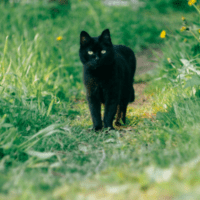Kitties are very mysterious little furballs, who have certainly gathered more than their fair share of myths and legends. In fact, for a cute, innocent-looking pet, Fluffy has amassed a rather impressive collection of urban—and rural—legends. A local vet lists a few of them below.
Cat Goddesses
Our feline friends have been associated with several different goddesses. The most well-known may be Egypt’s Bastet, who was often depicted in feline form. The ancient Greeks had their own kitty goddess, Ailuros, but also associated cats with Artemis and Athena. The Norse goddess Freya drove a chariot pulled by two large felines. The Hindu goddesses Durga and Parvati were also closely associated with big kitties.
Luck
Fluffy has also long been associated with luck, both good and bad. As you may know, black cats have long been considered unlucky in Western mythology. This is actually very unfortunate, as these superstitions continue to this day, and play a role in the low adoption rates of black cats. In other eras and cultures, black kitties have been considered good luck. In some instances, a cat’s luck depends on their coloring. For instance, Buddhist lore states that cats with dark fur bring gold, while lighter-colored furballs bring silver. Russian Blue cats are considered lucky in Russia. In China, luck and age are connected, with older furballs being the most fortunate.
Pussy Willow
The story of the pussy willow is one of the most enduring myths about our feline friends. This tale starts with a litter of playful kittens chasing butterflies on a sunny spring day. Unfortunately, the kittens fell into a river. Their mother, desperate, cried out in distress. Hearing her terrified meows, a willow tree on the riverbank lowered its branches into the water. The kittens grabbed the branches and climbed to safety, sopping wet and crying. According to legend, willow trees have extended branches with furry ‘kitten’ buds every spring since.
Immortality
Last but not least, we have that old adage about cats having nine lives. This one we can state for a fact isn’t true. While some of our patients do have an uncanny ability to escape dangerous situations, this is usually sheer luck. Keep your feline buddy safe and sound indoors, and make sure to keep them cool during the hot summer months. For more tips, check out our article on Keeping Your Kitty Cool. Of course, it won’t hurt to offer your feline overlord soft beds, fun toys, treats, and catnip.
Our Advice on Feline Folklore in 2024
What are the origins of the belief that cats have nine lives?
The belief that cats have nine lives likely stems from their remarkable agility and ability to often escape from perilous situations unscathed. This notion has been culturally reinforced over time, particularly through folklore and myth. Historical observations of cats’ abilities to survive falls or other dangers might have contributed to this myth. For instance, their righting reflex, which allows them to land on their feet, and their generally cautious nature could have been seen as a form of multiple lives or supernatural resilience. This led to the widespread adage celebrating their toughness and survival skills.
Are there any scientific or biological factors that may have contributed to the perception of cats as mysterious or supernatural beings?
Cats are often perceived as mysterious or supernatural due to several scientific and biological factors. Their highly refined nocturnal instincts and exceptional night vision allow them to move stealthily in darkness, enhancing their enigmatic aura. Cats also have an extraordinary sense of hearing and a unique vocal range, enabling communication in frequencies humans can’t detect. Additionally, their agility and ability to survive falls from significant heights contribute to perceptions of their having otherworldly abilities. These characteristics, combined with their independent nature, likely fueled ancient and modern myths about their supernatural qualities.
How have the attitudes towards cats and their associated folklore varied between different time periods?
Attitudes towards cats and their associated folklore have varied significantly across different time periods and cultures. In ancient Egypt, cats were revered as sacred creatures associated with gods like Bastet, embodying protection and fertility. In contrast, during medieval Europe, cats were often linked to witchcraft and bad luck, resulting in widespread persecution. In more modern times, especially in Western societies, cats are primarily viewed as companions, though some superstitions persist, such as the belief that black cats bring bad luck or good fortune depending on the region. This evolution reflects shifting cultural beliefs and societal norms surrounding these animals.
How have the superstitions and myths about cats influenced their treatment and care in different cultural contexts?
Superstitions and myths about cats have significantly influenced their treatment and care in various cultural contexts. For instance, in Western societies, black cats are often seen as harbingers of bad luck, negatively affecting their adoption rates from shelters. Conversely, in parts of Asia, cats are considered symbols of good fortune, particularly if they possess certain coat colors, which can increase their desirability as pets. These cultural beliefs can dictate how cats are treated, ranging from revered status to unwarranted neglect or avoidance, demonstrating the profound impact of folklore on animal welfare.
Are there any potential benefits or drawbacks to perpetuating the myths and legends surrounding cats in contemporary?
Perpetuating myths and legends about cats carries both potential benefits and drawbacks. On the positive side, these stories can enhance the cultural significance and allure of cats, fostering a deeper appreciation and affection for them as pets. However, there are significant drawbacks, such as the persistence of negative superstitions, like those surrounding black cats, which can hinder their adoption and welfare. Additionally, mythologizing cats can lead to misunderstandings about their actual needs and behaviors, potentially resulting in inappropriate care or expectations from their owners.
Do you have questions about your cat’s health or care? Contact us, your animal clinic in Hobe Sound, FL, today! We offer a range of services, including Veterinary Wellness & Pet Vaccinations, to keep your feline friend happy and healthy.




